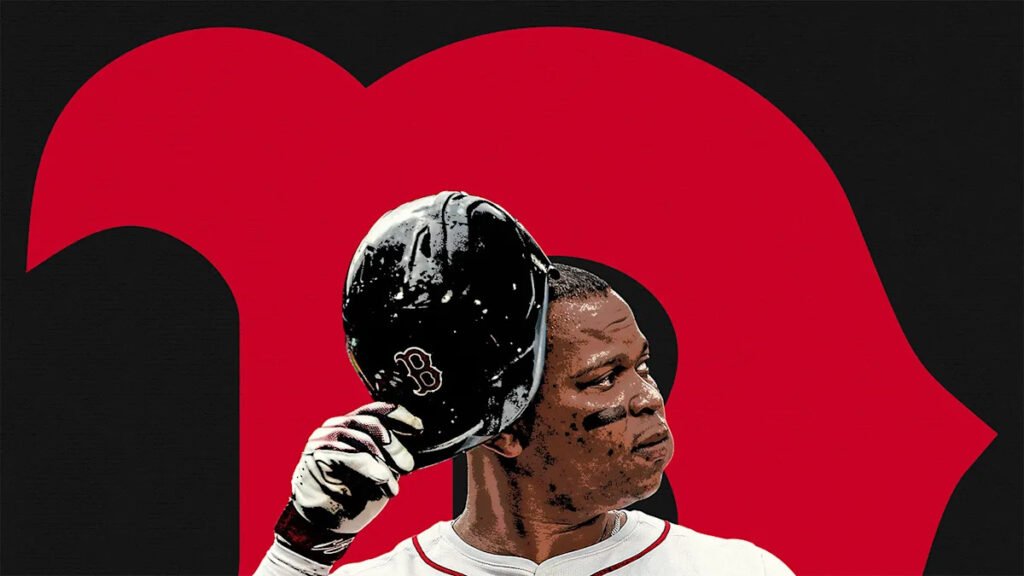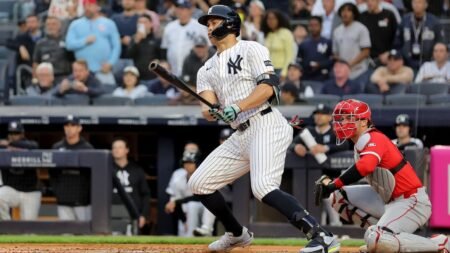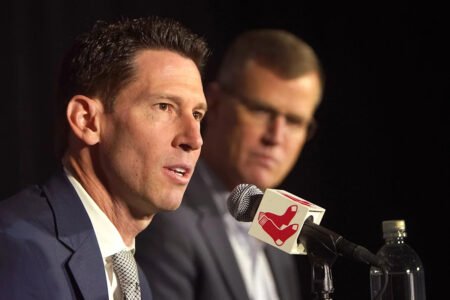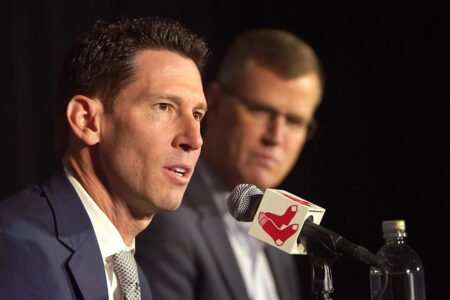BOSTON — Two hours before he was part of the season’s most surprising trade, Rafael Devers stood in the center of the Red Sox clubhouse, meeting the media after the team’s three-game sweep of the Yankees. Reporters asked him how he felt about the drama that had defined the early part of his 2025 season.
“That has passed,” he said through interpreter Carlos Villoria Benítez.
Advertisement
In a way, it had. Just not in the way he meant.
The deal — which sent Devers to the Giants in exchange for left-hander Kyle Harrison, reliever Jordan Hicks, outfield prospect James Tibbs III and rookie pitcher Jose Bello — was about more than a positional dispute or locker room tension. It wasn’t the result of a trade demand or a front office trying to shed salary. It was the culmination of eroded trust, fraying relationships and a deeper breakdown inside one of baseball’s most visible franchises.
The Red Sox have spent years telling fans that they’re building something sustainable. But when pressure mounts — whether over money, development or identity — the foundation keeps cracking. The Devers trade was not a fluke but a rupture.
Across Boston, the mood is unmistakable. Fans who were told to buy into a long-term plan are watching the team punt on another star they were told would be part of it. It’s impossible not to feel echoes of Mookie Betts — another homegrown star, dealt away during his prime, for reasons that were more financial and philosophical than baseball. The details are different, but the message feels familiar: When things get uncomfortable, the Red Sox flinch.
Advertisement
This past weekend, the Red Sox beat the Yankees in three straight. The ballpark was packed. The team seemed to be gaining real momentum. Then, without warning, they traded the face of the franchise. The front office might see that as bold, but to the fan base, it’s just another betrayal.
‘I’m not certain what [issue] he has with me’
This all started back in February, when the Red Sox signed Alex Bregman — another All-Star third baseman. At his first news conference of the season, Devers told reporters that the team had assured him third base was still his. Then they handed Bregman the job. Devers, the last remaining member of Boston’s 2018 World Series team, had signed a 10-year, $313.5 million extension in 2023 with the expectation that he’d be treated like a franchise player. Instead, he felt misled. He believed chief baseball officer Craig Breslow had gone back on his word.
“Third base is my position,” Devers declared.
Advertisement
A month later, Devers met with Breslow and manager Alex Cora to air things out. The conversation seemed productive. Devers said he was “good to do whatever they want me to do.” But the détente didn’t last. When Triston Casas went down with a season-ending injury on May 2, the Red Sox asked Devers to move to first base. He refused.
“I know I’m a ballplayer, but at the same time, they can’t expect me to play every single position out there,” Devers said through team interpreter Daveson Perez.
The frustration simmered. Inside the front office, sources say patience wore thin. Devers didn’t want to play a single inning at first base. And when asked about Breslow, his response was telling.
Advertisement
“I’m not certain what [issue] he has with me,” Devers said in May of Breslow, who played 12 seasons in the majors from 2005 through 2017. “He played ball, and I would like to think that he knows that changing positions like that isn’t easy.”
The standoff escalated as team owner John Henry flew to Kansas City alongside team president Sam Kennedy and Breslow to meet with Devers in person. Their conversation was private, but Devers returned to the lineup as the designated hitter, still unwilling to move.
The tension finally broke on Sunday. Hours after hitting a home run in a sweep-clinching victory, Devers was traded to San Francisco. The Giants will cover the remainder of Devers’ contract — more than $250 million through 2033.
Devers didn’t demand a trade, according to multiple team sources, but he communicated that he would be OK with one. The team didn’t shop him either, per ESPN’s Buster Olney, but listened to offers. Ultimately, none of that really mattered. The relationship had eroded past the point of repair.
Advertisement
What happened Sunday — the trade, the scramble, the silence that followed — represents just the latest fracture for a franchise quietly splintering behind the scenes. The Devers saga wasn’t just about positional conflict or clubhouse drama. It was a symptom of something deeper: a Red Sox organization that has lost its alignment, its patience and maybe even its identity.
Signs of a front office losing cohesion
The tension inside Fenway Park isn’t new. It has just evolved.
Manager Alex Cora and chief baseball officer Craig Breslow have not seen eye-to-eye on the direction of the team. Cora wants to win now. Breslow, like Chaim Bloom before him, was hired to build a sustainable future. The last time Cora found himself misaligned with the head of baseball ops, Bloom was fired. Breslow arrived shortly after and re-signed Cora to a three-year contract through the 2027 season that pays him $7 million annually. After the Red Sox finished 81-81 and out of the playoffs in 2024, Breslow’s first season at the helm, the team went out and acquired ace pitcher Garrett Crochet and Bregman, signaling a shift back toward contention. Owner John Henry celebrated with a cigar.
Advertisement
Even then, Cora wasn’t fully on board with how the front office wanted to manage the roster and player development. This season, Cora has managed like someone who knows his legacy is on the line, leaning into experience over upside, even when it conflicts with the long-term plan. He benched top prospects and left-handed sluggers Marcelo Mayer and Roman Anthony against left-handed pitching, despite their strong minor league splits, opting for veteran right-handed bats in Rob Refsnyder and Romy Gonzalez. The choice underscored the ongoing friction: Cora’s focus on winning now clashing with a front office preaching sustainable growth.
“This team is supposed to play better baseball and be in the hunt. We’re not there yet,” Cora said last week. “My job is to try to maximize matchups and help win games. We haven’t done that.”
Meanwhile, Breslow has grown increasingly insulated. Multiple sources within the organization describe a front office losing cohesion. Staffers who helped build four championship teams — veterans of the Theo Epstein, Ben Cherington, Dave Dombrowski and Bloom regimes — now feel shut out of the operation. The collaborative spirit that once defined Red Sox baseball operations has frayed.
The discontent intensified in May 2024, when Breslow brought in sports consulting firm Sportsology to conduct an organizational audit. The stated purpose was to streamline baseball operations. In practice, it triggered a wave of firings and accelerated the marginalization of some of the longest-tenured voices in the building, characterizing the cultural shift to align more with Wall Street efficiency.
Advertisement
One of the clearest signals came during an internal team Zoom meeting earlier this season. Toward the end, Craig Moesche — the Red Sox’s scouting supervisor and a team employee since 2017 — thought the call had ended. It hadn’t. As the meeting wrapped, his voice cut through a quiet moment.
“Thanks, Bres, you f***ing stiff,” Moesche said, according to two team sources.
The words landed like a grenade, and Breslow fired Moesche.
Moesche did not respond to a request for comment.
The blockbuster trade of Rafael Devers was the culmination of eroded trust, fraying relationships and a deeper breakdown inside one of baseball’s most visible franchises. (Grant Thomas/Yahoo Sports)
(Grant Thomas/Yahoo Sports)
Dysfunction on the field and hands-off ownership
The internal strain has bled into how the Red Sox handle their players, too.
Advertisement
The coaching staff has grown frustrated with the state of player development, specifically how much emphasis is placed on swing mechanics and hitting data, often at the expense of fundamentals. That imbalance, coaches believe, traces back to the Bloom era and has only accelerated under Breslow. One example cited is rookie Kristian Campbell, who has made a string of routine errors at second base since being called up. He’s not alone; as a team, the Red Sox lead all of baseball with 64 errors, one more than the Colorado Rockies and 17 more than the third-place Los Angeles Angels.
Another error came during Roman Anthony’s debut, when he misplayed a ball in right field. The next day, Anthony was sent out to run outfield drills in front of the media. Multiple people in the organization noted that under previous regimes, that kind of instruction would’ve taken place behind closed doors. This time, it felt like a message from the coaching staff to the front office. One team source described the message as deliberate: “This is what we still have to teach, at the big-league level.”
Ownership, meanwhile, has grown increasingly hands-off. Since Epstein’s tenure, Red Sox owners have often acted as active stewards of baseball operations — meddling at times but always deeply invested. But now, multiple sources say there’s a growing sense that John Henry delegates the day-to-day operations of the Red Sox to team president Sam Kennedy. That detachment has created an opening for divergent priorities across Fenway Sports Group’s portfolio. Case in point: Just days before the Devers trade, FSG made headlines in England by spending a record £116 million ($157.7 million) on German star Florian Wirtz at Liverpool. Meanwhile, in Boston, they were preparing to offload their franchise star.
The optics are staggering. On a picturesque Sunday afternoon, the Red Sox swept the Yankees. Hours later, they traded Devers. No farewell. Just silence. One staffer described the situation as “an absolute s*** show.”
Advertisement
Kennedy, Breslow and Cora did not respond to requests for comment.
For a franchise that once set the standard for modern baseball operations, dysfunction has become the new normal.
Where do the Red Sox go from here?
The Red Sox believe their blockbuster trade represents a clean break from a contract they no longer believe in. Devers, for all his production, hitting .272/.401/.504 with 15 homers and 2.2 bWAR this season, was stubborn. He resisted stepping into a leadership role. After Xander Bogaerts left in 2023, Cora clearly wanted Devers to fill the void. When I asked Devers about it back then, he was honest: “I don’t really see myself too much as a leader right now.” That reluctance never really changed.
Advertisement
But to reduce this entire saga to Devers’ shortcomings is to miss the point. His unwillingness to move to first base wasn’t just a personal decision. It was a reaction to a team that no longer made sense around him.
Inside the clubhouse, players watched as the coaching staff publicly flagged Roman Anthony’s defensive fundamentals as a slight to the front office. They saw teammates asked to switch positions on the fly. They witnessed Cora trying to win baseball games while benching the team’s top prospects. In the front office, scouts were fired over slights, veteran leaders with deep organizational trust were iced out, and the communication from Breslow dried up. According to multiple sources, Devers was also upset when the rookie Campbell volunteered to play first base this season — interpreting it as a slight to his own stature.
In the end, though, Devers was still hitting and was ready to move past the early-season drama. Breslow saw things differently, saw the slugger as a problem that needed to be solved. For him, the trust was gone. And now, so is Devers.
Maybe this will work out for the Red Sox. Maybe Kyle Harrison becomes an ace, Jordan Hicks finds another gear and James Tibbs III turns into an every-day outfielder. But in the hours since the trade, that possibility has felt secondary to what it revealed: A franchise that claims to be building something stable keeps unraveling when the pressure rises.
Read the full article here














